Social CRM incorporates strategies that utilize social media channels for customer relationship management. Focusing on multi-channel customer experience, it ensures effective communication by these platforms to get more customer engagement and retention. Insights are being used from customer social media data to understand what is going on with customers’ sentiments.
To add on, this strategy analyzes customer interactions to get improvement in customer service. If the social media strategy is well-defined, it helps companies manage customer relationships and also gain benefits from social CRM.
Introduction to social CRM
The CRM is a strategy that involves the utilization of social media channels for boosting customer engagement and managing more customer interactions. By leveraging customer social media data, businesses can gain insights into customer sentiment, therefore, improving their multi-channel customer experience.
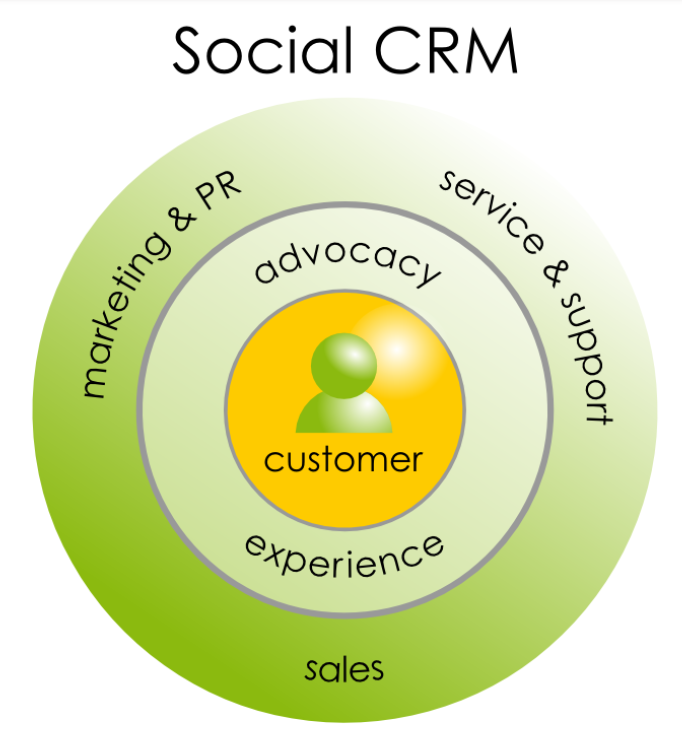
Social CRM plays a critical role in lead generation, transforming traditional communication channels into more personalized, social selling platforms that amplify customer service efforts. Using a social CRM solution not only solves centralizing customer data but also enables businesses to implement an effective social media strategy that drives customer engagement and helps in growth.
Definition and importance of social CRM
It's obvious that CRM is a strategy that integrates social media platforms with customer relationship management. It involves tracing customer interactions on social media channels and then again harnessing customer social media data to enhance customer service. It is important to observe that in lead generation and managing customer sentiment, the CRM provides a seamless multi-channel customer experience.
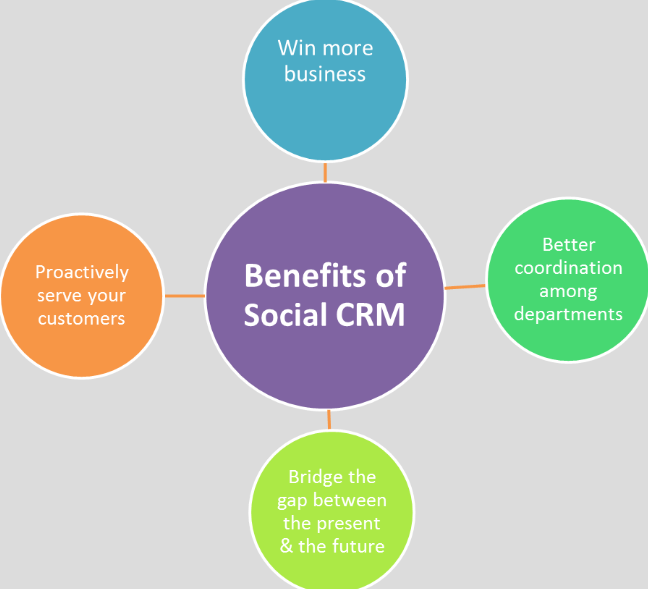
Embracing social CRM is very essential nowadays. It makes businesses better understand what the customer is demanding as well as establish effective connections between channels. CRM also helps in planning and executing a successful social media strategy, offering individual customer interactions, and eventually driving rapid social selling.
How social CRM differs from traditional CRM
Social CRM differs from traditional CRM a lot. In general, traditional CRM focuses on the management of customer data and the growth of customer service. On the other hand, social CRM uses social media channels and this improves customer engagement and the multi-channel customer experience.
One thing is clear: Unlike traditional CRM, social CRM uses the customer's social media information to analyze customer sentiment and also helps businesses customize their communication channels for better customer interactions with customer retention. It is important to mention that social CRM plays a vital role in social selling plus lead generation by effectively using a social media strategy across various social media platforms.
Streamlining project tasks with Bonsai CRM
With the rise of digital platforms, businesses are increasingly implementing CRM project management to handle social media interactions. Having an organized system not only streamlines processes but also significantly enhances customer engagement. Therefore, integrating a social media CRM system is essential for contemporary businesses to thrive.
Streamlining project tasks is a an important component of effective project management. Bonsai CRM (Customer Relationship Management) plays a vital role in this process. Bonsai CRM offers a solution, allowing you to streamline project tasks while keeping customer relationships at the forefront.
Here's an in-depth look at how to enhance task management, along with its features:
1. Centralization of information
Bonsai CRM allows users to add leads, existing clients, and internal notes to keep track of all contacts in one place. This centralized database makes it easy to manage relationships and follow up on potential deals. It consolidates all information into one accessible platform, reducing the time spent on searching for client details and ensuring that every team member has the latest updates at their fingertips. This centralization is important for maintaining a clear overview of customer interactions and project progress.

2. Automation of routine tasks
Automation is the art of letting the system do the work for you. Bonsai CRM can automate repetitive tasks such as scheduling follow-ups, sending out reminders, or updating records. This not only saves valuable time but also reduces the risk of human error, ensuring that the project workflow remains smooth and uninterrupted.
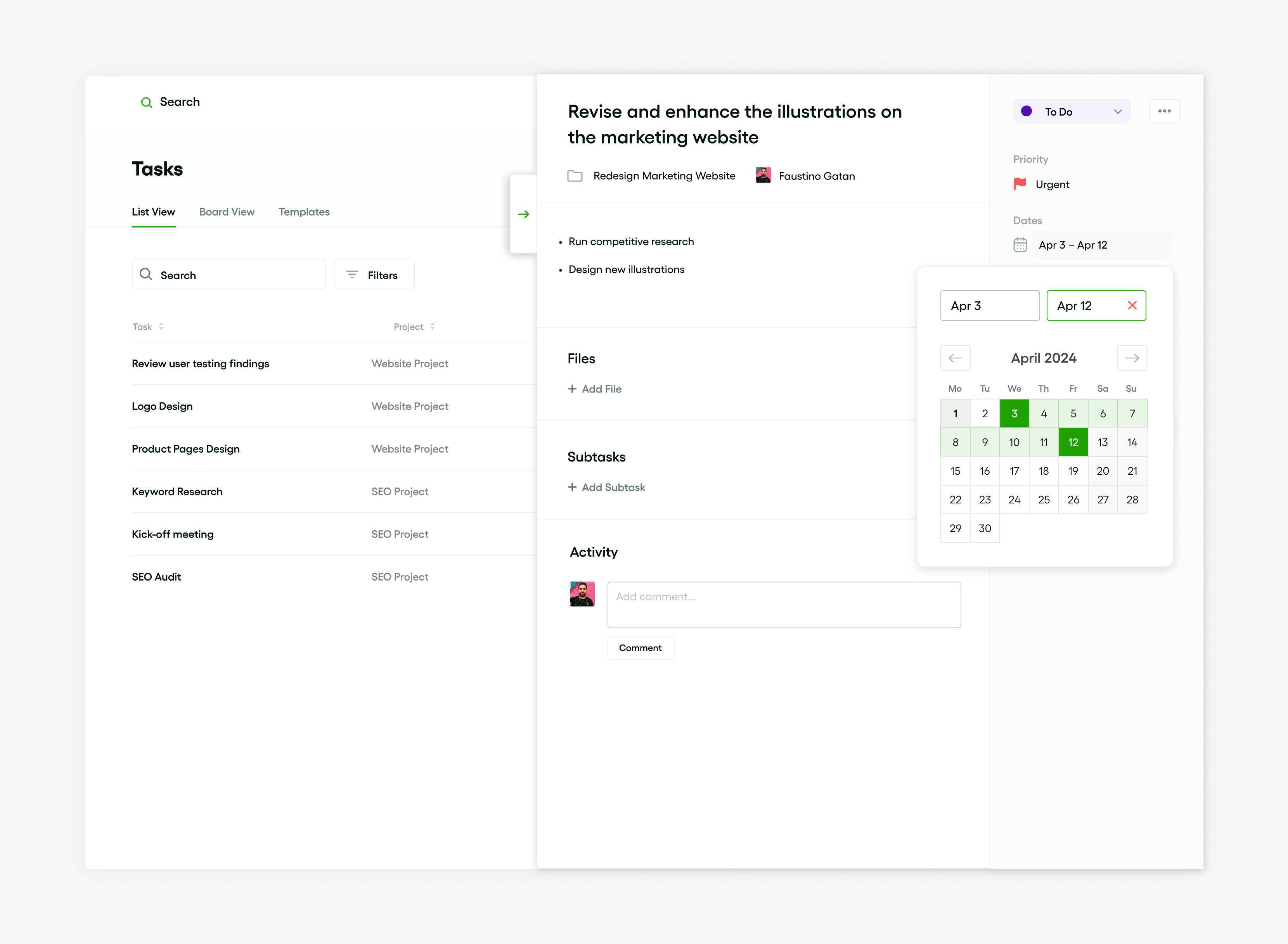
3. Enhanced collaboration
Bonsai CRM fosters a collaborative environment by providing tools that facilitate communication and task sharing among team members. With features like shared calendars, task assignments, and progress tracking, team members can work together seamlessly, regardless of their physical location. This level of collaboration is essential for keeping everyone aligned and focused on common goals.
4. Data-driven decision making
With Bonsai CRM, data is not just collected; it's used to make informed decisions. The system provides analytics and reporting tools that help project managers understand customer behaviors, task completion rates, and overall project health. These insights enable managers to make strategic adjustments to the project plan, ensuring that resources are allocated efficiently and deadlines are met.

Bonsai CRM is not just a tool; it's a strategic approach to managing projects and nurturing customer relationships. By streamlining tasks and focusing on efficiency, businesses can deliver exceptional customer experiences and drive project success. Just as a bonsai tree is carefully shaped to achieve its ideal form, Bonsai CRM shapes the project workflow to create a balanced and productive ecosystem.
Embracing Bonsai CRM strategies means committing to a philosophy of continuous improvement and customer-centricity, ensuring that every project task is handled with the precision and care it deserves.
Benefits of social CRM for agencies
Social CRM provides many advantages to agencies. An interesting thing to observe is It enables the efficient use of social media channels for customer service along with boosting customer engagement, and retention. You should know that Social CRM lets agencies access valuable customer social media information, gauging customer sentiment and tailoring multi-channel customer experiences as a customer wants.
What's fantastic is that it enriches the social media strategy by acting like a tool for lead generation and social selling. The cool thing about this is it enables individual customer interactions on various social media platforms. Thus, the application of Social CRM is vital to harness and analyze customer data, improving services, and bolstering growth.
Enhanced customer engagement
The successful integration of customer relationship management and social media channels in a business strategy can greatly enhance customer engagement. Leveraging customer social media data can give businesses an edge in understanding customer sentiment.
By using different communication channels whether it is for customer service or social selling; it interacts with the customer very fast. Incorporating these methods into a social media strategy can ultimately lead to the growth of your business on various social media platforms.
Improved customer service
What’s worth noticing is if you want to achieve an improvement in customer service, it is a must to use social media channels in a proper way and optimize customer relation management. Social media makes an excellent platform for customers to interact and show their sentiments via their social media data. And it easily caps your customer engagement.
What's cool is, if the social media strategy is comprehensive, then it ensures a multi-channel customer experience, which impacts customer retention positively. Usually, customer data derived from this practice can be instrumental in lead generation, contributing to overall business growth. By adopting the tactics of social media selling, it could further strengthen the process, plus emphasize the importance of online presence in enhancing customer service.
Increased sales opportunities
It is fair to say that by analyzing social media channels for lead generation and social selling– it can easily increase the sales opportunity. Through effective customer relationship management, every business can streamline customer interactions on different platforms, enhancing the multi-channel customer experience.
To boost customer engagement and retention, we can analyze the customer's media data and customer sentiment by creating targeted social media strategies. Clearly, this data-driven approach not only improves customer service but also makes a lot of new communication channels for businesses.
Key features of social CRM
Social CRM keeps the power of social media channels to get customer engagement, improve customer service, and enhance customer retention. What’s remarkable is key features include gaining insights from customer social media data such as: customer sentiment and interactions on social platforms to create an individual multi-channel customer experience.
Integration with social media platforms
It's important to integrate social media platforms into a company's customer relationship management so that it can enhance customer service and boost customer retention. Utilizing customer social media data allows businesses to understand customer sentiment perfectly, providing insights that can be used to improve multi-channel customer experience.
In general, major social media channels serve as excellent communication channels that enable direct customer interactions.
An appropriate social media strategy is also invaluable for lead generation through social selling.
Companies can further optimize the use of social media platforms by integrating them into their customer data systems.
Customer interaction tracking
If customer interaction tracking is effective, then it plays a critical role in optimizing customer relationship management. By leveraging social media channels, businesses can analyze customer social media data to determine customer sentiment as well as improve multi-channel customer experience. The fantastic thing is it includes maintaining a robust social media strategy that facilitates social selling on various social media platforms.
Enhanced customer engagement, promoting customer retention which leads to more effective lead generation– all of this we can get by detailed customer interaction tracking. As communication channels continue to extend and diversify, comprehending and utilizing customer data to influence strategy remains best.
Analytics and reporting
Analytics and Reporting are vital parts of a successful social media strategy. Mostly, It involves generating and analyzing customer data sourced from various communication channels like social media platforms. Evidently, this enables organizations to better understand customer interactions, and customer sentiment, and also to get the efficiency of customer service.

This information is indispensable in effective customer relationship management. By providing insights about the multi-channel customer experience, It leads to improved customer engagement, retention, and social selling. The data derived aids organizations in lead generation and enhances their overall performance.
Top social CRM tools for agencies
Social media platforms have increasingly become crucial tools in handling customer relationships. It's important to truly leverage these tools effectively, and integrating them with a CRM can transform how businesses interact with their clients. For more insight on this, check out these CRM software examples.
For each and every agency focusing on boosting their social media presence, enhancing their customer relationship management is important. Bonsai CRM stands out, offering a comprehensive overview of customer interactions, and facilitating proper multi-channel customer experience.
Another fascinating tool is HubSpot, it centralizes communication channels by offering a consolidated platform for social selling and strategizing customer service over various social media platforms. Thirdly, Zoho CRM helps agencies streamline their business operations, prioritizing customer sentiment analysis and robust customer data management.
Insights of Bonsai CRM
Another surprising software is Bonsai CRM. It gives a wealth of insights that are particularly beneficial for agencies looking to optimize their operations and client relationships. By using its huge set of features, the Bonsai CRM system empowers agencies to manage leads. Another significant thing is it automates workflows, and provides a top-notch client experience, all while maintaining profitability.
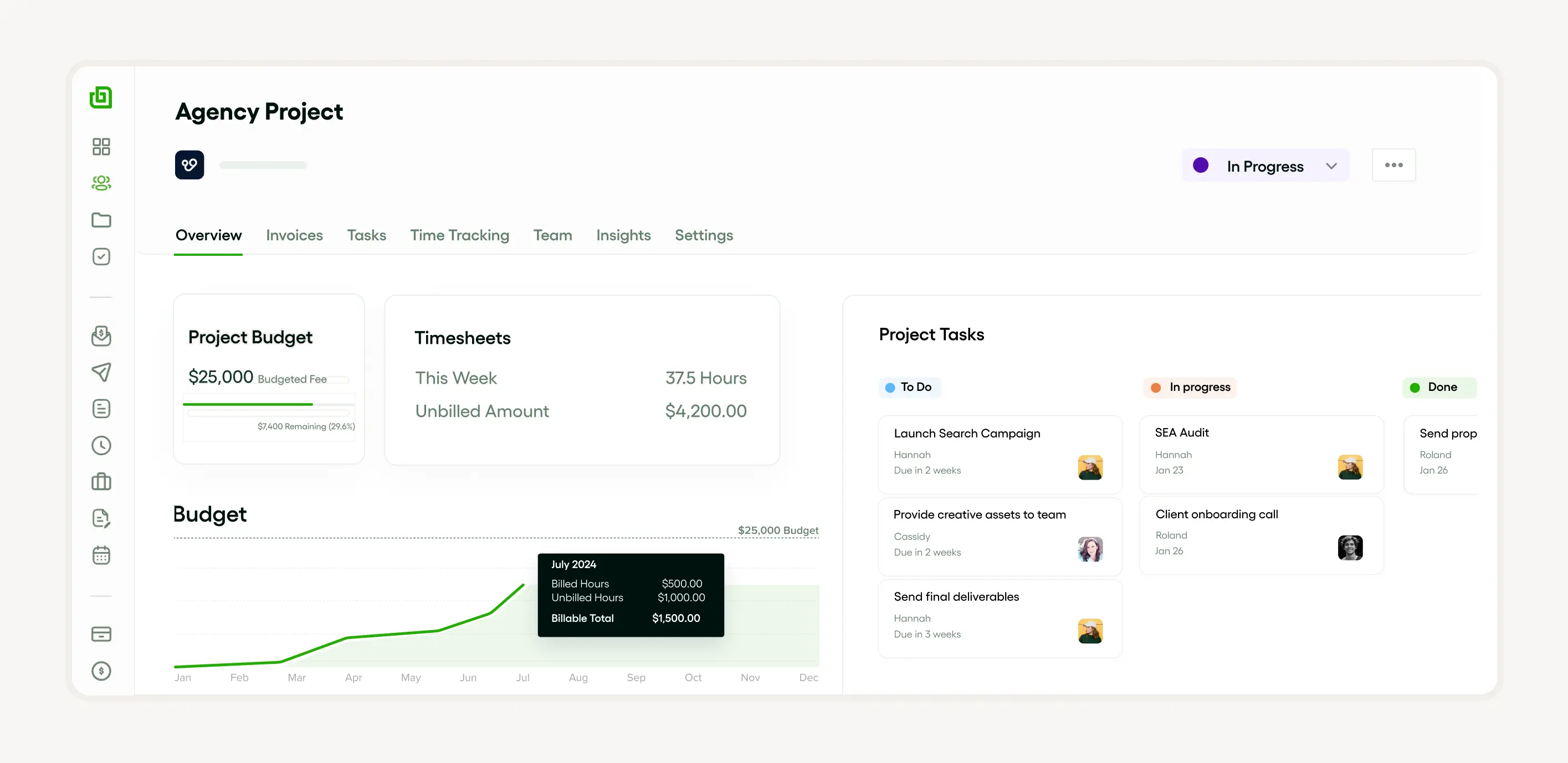
Here are the key features of Bonsai CRM:
- Bonsai CRM streamlines the client workflow as well as makes it easier for agencies to manage leads and convert them into clients.
- Integrated tools within Bonsai CRM allow for efficient organization and monitoring of project delivery, ensuring projects are completed on time and within budget.
- Detailed finance reports give agencies track revenue and simplify billing processes, putting billing on autopilot with features like recurring payments and retainers.
- The Bonsai CRM's reports provide agencies with the necessary tools to nurture client relationships and optimize operations for better profitability.
- Features like task allocation with set priorities and tags give teams to be faster and more productive, delivering excellent client experiences.
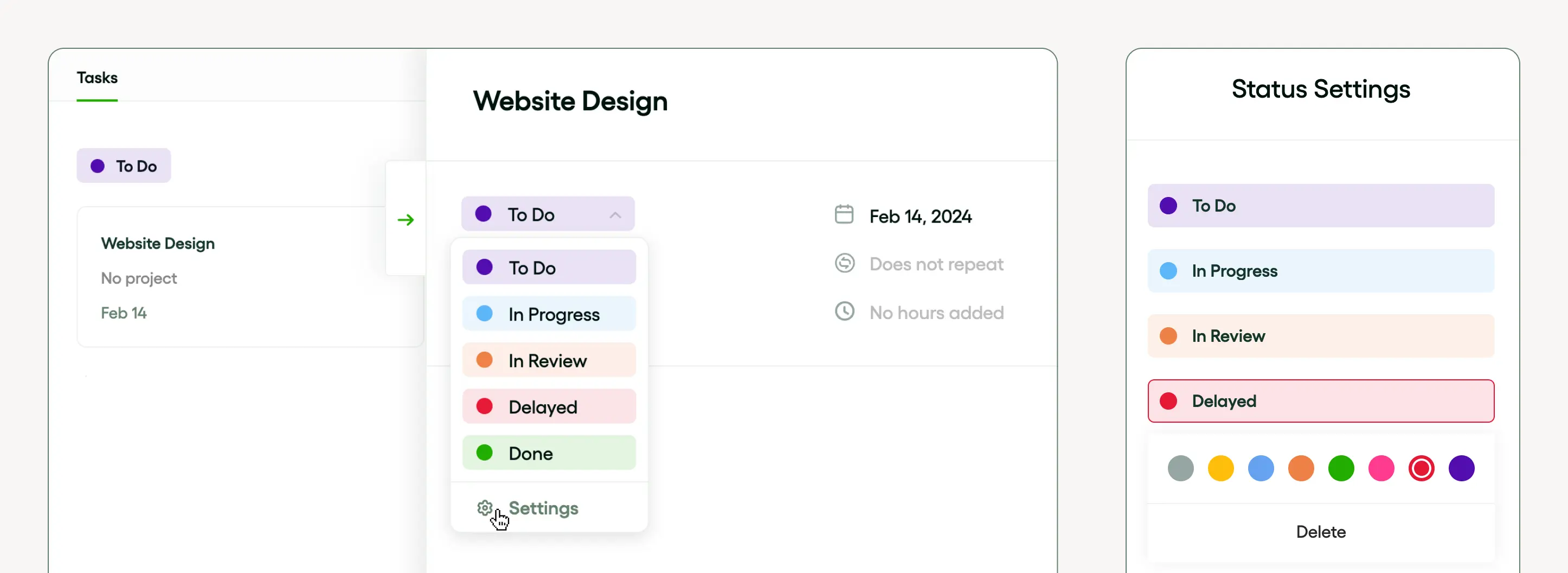
Clearly, Bonsai CRM is there to support agencies in their quest for growth and efficiency. It provides clarity on financials and enhances client management, by boosting project management capabilities. Agencies can make smarter business decisions and improve client satisfaction by leveraging Bonsai CRM.
Overview of Salesforce Social Studio
Another powerful customer relationship management tool is Salesforce Social Studio. It allows businesses to engage and interact with customers from various social media channels. It enables companies to observe customer sentiment, enhance customer service, and strengthen customer engagement by harnessing customer social media data.
The best thing is it plays an integral role in multi-channel customer experience. With Social Studio, we can build an effective social media strategy, companies can optimize their social selling efforts on popular social media platforms.
Features of Zoho Social
Zoho Social is a comprehensive tool designed to enhance customer relationship management through boosting the efficiency and effectiveness of your social media strategy. Mostly, this platform enables businesses to manage multiple social media channels, providing in-depth customer social media data which assists in generating leads and improving customer service.
Apart from offering communication channels, this CRM tool is also designed for social selling, as well as fostering customer engagement and retention.
Benefits of Sprout Social
Sprout Social plays a crucial role that benefits businesses in developing a robust social media strategy. This platform provides customer relationship management tools that allow companies to optimize their customer service through improved engagement and interactions on several social media channels. Whether it's analyzing customer social media data to better understand customer sentiment or getting a multi-channel customer experience, this platform is designed to increase customer retention and facilitate social selling.
In short, Sprout Social boosts customer engagement with your brand and helps to maintain and grow your online customer base.
Implementing a social CRM strategy
If the implementation of a Social CRM Strategy is effective, it revolves around the efficient utilization of customer social media data. This gets an understanding of customer sentiment through their customer interactions on social media platforms. Strategically managing these, coupled with a powerful social selling approach can improve customer engagement and give us lead to better customer retention.
One notable thing is using social media channels for customer service not only helps resolve customer issues effectively but also provides a multi-channel customer experience. You have to make sure to maximize communication channels to take advantage of customer data for advantageous lead generation. Just remember, customer relationship management benefits highly from a well-tailored social media strategy.
Identifying your target audience
Who is your audience is key to implementing effective customer relationship management. Understanding customer interactions, especially on social media channels, is a must. Analysis of customer social media data can provide insights into customer sentiment, helping shape a multi-channel customer experience to increase customer retention.

Another key element to notice is devising a social media strategy that promotes lead generation while maintaining excellent customer service. If customer engagement is high on social media platforms, enhancing both customer and business relations is very easy.
Choosing the right social CRM tool
It is important to choose the right Social CRM Tool for successful customer relationship management. If the tool is ideal, it should help you effectively manage customer interactions across multiple communication channels including social media platforms.
Some critical features to consider should include customer service capabilities, the ability to analyze customer social media information, and tools for understanding customer sentiment. These functions are necessary for enhancing customer engagement and improving lead generation as it's also a part of the strategy.
Training your team on social CRM
Training for social CRM is essential and it is crucial to underline the importance of customer relationship management. We have to ensure that they understand how to leverage various social media channels to gather customer data and facilitate customer interactions, boosting engagement and retention. Incorporate the concepts of social selling, and customer social media data to enhance lead generation.
You should teach your team to assess customer sentiment accurately, fostering a multi-channel customer experience. Mark the need for a robust social media strategy that exploits numerous communication channels.
Best practices for using social CRM
If the utilization of Social CRM is Successful, it involves keen attention to customer interactions and data across various social media platforms. This CRM tool will optimally benefit your business when strategies emphasize customer engagement and retention.
A multi-channel customer experience should be targeted with distinctive social media strategies tailored for different communication channels. Data driven insights taken from customer social media data and customer sentiment should guide lead generation and social selling decisions.
Monitoring and responding to customer interactions
Monitoring customer interactions on various social media platforms forms a vital part of CRM strategy. It provides valuable insights into customer sentiment and behavior. Through responding timely, you can enhance customer service leading to improved customer engagement and ultimately, customer retention.
It's proven that social media channels are beneficial in multi-channel customer experience by providing an interactive platform for social selling. Using customer social media data can serve as a powerful tool for lead generation. Here, a robust social media strategy is crucial for effective communication, customer engagement, and fostering customer loyalty.
Utilizing analytics for decision making
For decision-making, businesses can leverage analytics. By analyzing customer social media data, brands can understand customer sentiment, enhancing customer engagement and retention.
In addition, this analysis provides insight into customer interactions across various social media channels, aiding in effective social media strategy development.
It's not only for retention; it extends to lead generation also. By leveraging customer data and using tools for social selling, businesses can identify potential leads, personalize their approach, and increase conversion rates across different social media platforms.
Integrating social CRM with other marketing strategies
Integrating Social CRM into your marketing strategies not only enhances customer engagement but also improves lead generation. By using customer social media data, businesses can personalize their approach to communicate effectively across multiple channels. Embracing social selling through various social media platforms gives stronger customer interactions and customer retention.
Continually, a keen social media strategy allows a better understanding of customer sentiment by enriching the multi-channel customer experience. Gathering all these marketing strategies and Social CRM ultimately optimizes customer relationship management.
Conclusion: The future of social CRM
By looking at the future of customer relationship management we see, it lies in further leveraging social media channels and customer social media data to get more customer service. This evolution will be pivotal in understanding customer sentiment, shaping the multi-channel customer experience, and crafting efficient communication channels. Increased emphasis will be on customer engagement and retention, with strategies geared towards utilizing data for lead generation and better customer interactions.
One thing is for sure: The adoption of social selling will become more widespread as businesses catch the potential of various social media platforms. Beyond just a tool for customer service, social CRMs in the marketing and sales process will be increasingly vital, shaping businesses' social media strategy for years to come.








